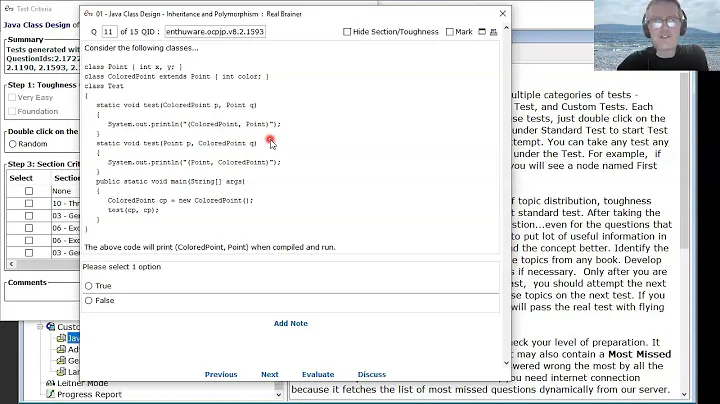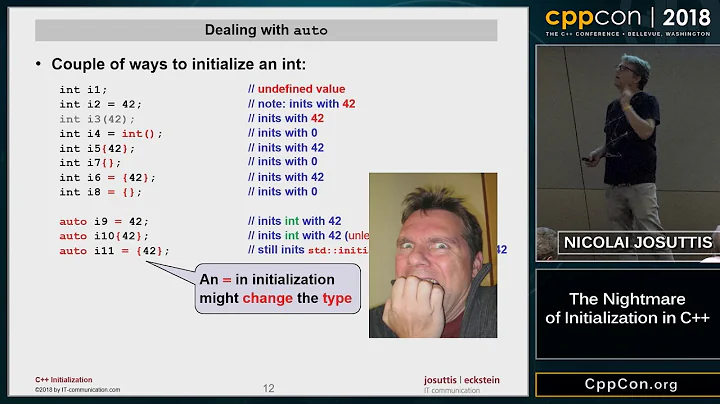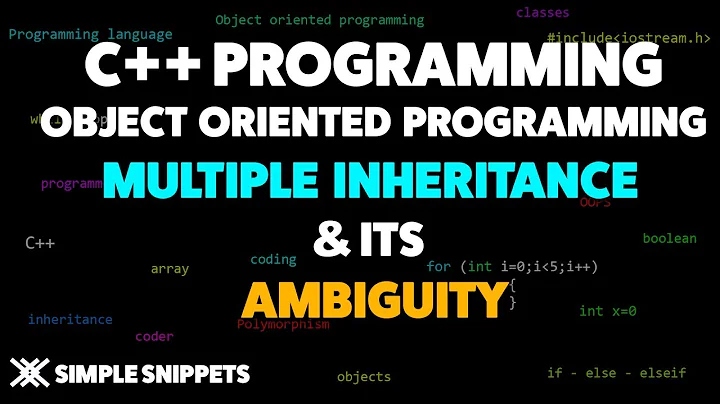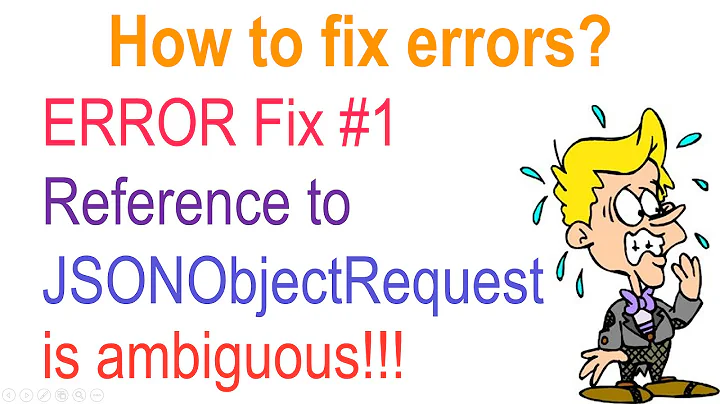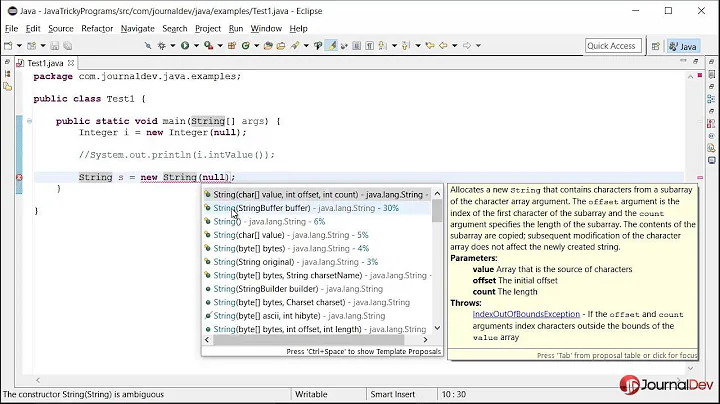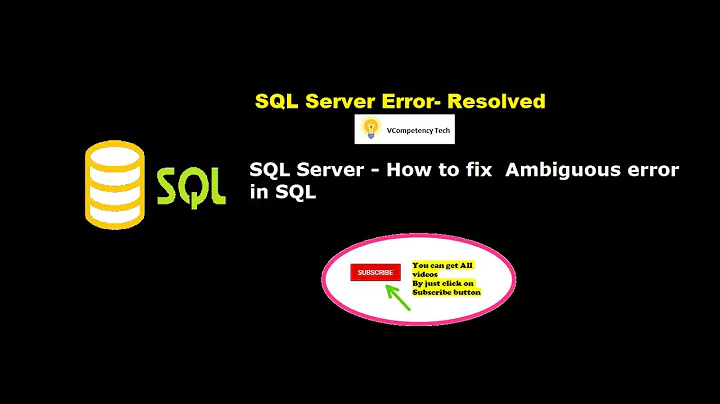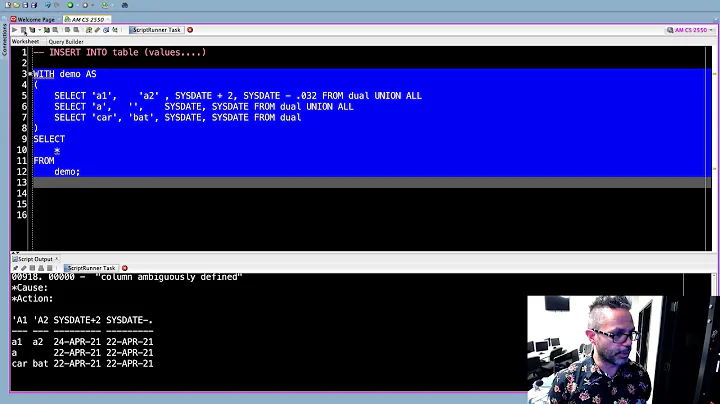Compiler error : reference to call ambiguous
Solution 1
Finding the most specific method is defined in a very formal way in the Java Language Specificaion (JLS). I have extracted below the main items that apply while trying to remove the formal formulae as much as possible.
In summary the main items that apply to your questions are:
- JLS 15.12.2: your use case falls under phase 3:
The third phase (§15.12.2.4) allows overloading to be combined with variable arity methods, boxing, and unboxing.
- Then JLS 15.12.2.4 basically determines that both method are applicable, because 10 can be converted to both an
Integer...or anint.... So far so good. And the paragraph concludes:
The most specific method (§15.12.2.5) is chosen among the applicable variable-arity methods.
- Which brings us to JLS 15.12.2.5. This paragraph gives the conditions under which an arity method
m(a...)is more specific than another arity methodm(b...). In your use case with one parameter and no generics, it boils down to:
m(a...)is more specific thanm(b...)iifa <: b, where<:meansis a subtype of.
It happens that int is not a subtype of Integer and Integer is not a subtype of int.
To use the JLS language, both call methods are therefore maximally specific (no method is more specific than the other). In this case, the same paragraph concludes:
- If all the maximally specific methods have override-equivalent (§8.4.2) signatures [...] => not your case as no generics are involved and Integer and int are different parameters
- Otherwise, we say that the method invocation is ambiguous, and a compile-time error occurs.
NOTE
If you replaced Integer... by long... for example, you would have int <: long and the most specific method would be call(int...)*.
Similarly, if you replaced int... by Number..., the call(Integer...) method would be the most specific.
*There was actually a bug in JDKs prior to Java 7 that would show an ambiguous call in that situation.
Solution 2
Looks like it's related to bug #6886431, which seems to be fixed in OpenJDK 7.
Below is the bug description,
Bug Description:
When invoking a method with the following overloaded signatures, I expect an ambiguity error (assuming the arguments are compatible with both):
int f(Object... args);
int f(int... args);
javac treats the second as more specific than the first. This behavior is sensible (I prefer it), but is inconsistent with the JLS (15.12.2).
Solution 3
from JLS 15.12.2.2
JLS 15.12.2.2 Choose the Most Specific Method
IIf more than one method declaration is both accessible and applicable to a method invocation, it is necessary to choose one to provide the descriptor for the run-time method dispatch. The Java programming language uses the rule that the most specific method is chosen. The informal intuition is that one method declaration is more specific than another if any invocation handled by the first method could be passed on to the other one without a compile-time type error.
neither of these methods can be passed to the other (the types for int[] and Integer[] arent related) hence the call is ambiguous
Solution 4
The compiler doesn't know which method should be called. In order to fix this, you need to cast the input parameters..
public static void main(String... args) {
call((int)10);
call(new Integer(10));
}
EDIT:
It is because the compiler tries to convert the Integer into int, Therefore, an implicit cast takes place prior to invocation of the call method. So the compiler then looks for any methods by that name that can take ints. And you have 2 of them, so the compiler doesn't know which of both should be called.
Related videos on Youtube
Ravi
Check-out my open source library : rabbitFT : It is a library for sharing file through SFTP or Sharepoint channel.
Updated on October 09, 2022Comments
-
Ravi over 1 year
Case 1
static void call(Integer i) { System.out.println("hi" + i); } static void call(int i) { System.out.println("hello" + i); } public static void main(String... args) { call(10); }Output of Case 1 : hello10
Case 2
static void call(Integer... i) { System.out.println("hi" + i); } static void call(int... i) { System.out.println("hello" + i); } public static void main(String... args) { call(10); }Shows compilation error
reference to call ambiguous. But, I was unable to understand. Why ? But, when I commented out any of thecall()methods fromCase 2, then It works fine. Can anyone help me to understand, what is happening here ? -
Ravi over 11 yearsyou just told the solution. My question was why ?? why it is not working ?? Any reference ?
-
Ravi over 11 yearsWhich means, its bug of java ??
-
 Jayamohan over 11 yearsWhich version of Java you are using. If possible provide your eclipse version too.
Jayamohan over 11 yearsWhich version of Java you are using. If possible provide your eclipse version too. -
radai over 11 yearsthe bug you mentioed makes things compile when they shouldnt. this isnt it.
-
 Jayamohan over 11 yearsPlease don't guess your versions. Be specific. I requested your eclipse version too(If you are using Eclipse).
Jayamohan over 11 yearsPlease don't guess your versions. Be specific. I requested your eclipse version too(If you are using Eclipse). -
Ravi over 11 yearsIts jdk7, i just guess, because, i didn't remember exact version. I mean, JDK 1.7.0_19
-
 assylias over 11 yearsAlthough this is related, it is because the bug has been fixed that the call is ambiguous. So this does not really answer the question.
assylias over 11 yearsAlthough this is related, it is because the bug has been fixed that the call is ambiguous. So this does not really answer the question. -
 assylias over 11 yearshow about
assylias over 11 yearshow aboutdouble[]andint[]: these aren't related either but replacingIntegerbydoublewould remove the compile error (in JDK 7+). -
 assylias over 11 yearsYou make a confusion:
assylias over 11 yearsYou make a confusion:S1isint, notint[]. -
mishadoff over 11 years@assylias
S1one of the method parameters, method have just one parameterint[] -
 assylias over 11 years
assylias over 11 yearsSiis defined asSi = Uiand U is defined asU1, ..., Uk-1, Uk[]=>Uk[] <=> int[]=>Uk <=> int. If it were not the case,m(Number...)would not be more specific thanm(Object...)for example, because (following your reasoning)Number[]is not a subtype ofObject[]. -
bacar about 10 yearsIt's worth remarking that the reason case 1 is not considered ambiguous is also described in JLS §15.12.2: "This guarantees that any calls that were valid in the Java programming language before Java SE 5.0 are not considered ambiguous as the result of the introduction of variable arity methods, implicit boxing and/or unboxing." Before Java 5, there was no implicit boxing, and
call(Integer i)would not be considered, hence no ambiguity. -
Mohsen Kashi over 9 yearsThis problem exists in JDK8u20


